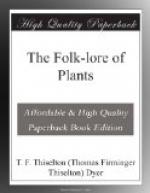On the other hand, in some countries there is a very strong prejudice against the wild anemone, the air being said “to be so tainted by them, that they who inhale it often incur severe sickness.” [6] Similarly we may compare the notion that flowers blooming out of season have a fatal significance, as we have noted elsewhere.
The sacred associations attached to many plants have invested them, at all times, with a scientific repute in the healing art, instances of which may be traced up to a very early period. Thus, the peony, which, from its mythical divine origin, was an important flower in the primitive pharmacopoeia, has even in modern times retained its reputation; and to this day Sussex mothers put necklaces of beads turned from the peony root around their children’s necks, to prevent convulsions and to assist them in their teething. When worn on the person, it was long considered, too, a most effectual remedy for insanity, and Culpepper speaks of its virtues in the cure of the falling sickness. [7] The thistle, sacred to Thor, is another plant of this kind, and indeed instances are very numerous. On the other hand, some plants, from their great virtues as “all-heals,” it would seem, had such names as “Angelica” and “Archangel” bestowed on them. [8]
In later times many plants became connected with the name of Christ, and with the events of the crucifixion itself—facts which occasionally explain their mysterious virtues. Thus the vervain, known as the “holy herb,” and which was one of the sacred plants of the Druids, has long been held in repute, the subjoined rhyme assigning as the reason:—
“All hail, thou holy herb, vervin,
Growing on the ground;
On the Mount of Calvary
There wast thou found;
Thou helpest many a grief,
And staunchest many a wound.
In the name of sweet Jesu,
I lift thee from the ground.”
To quote one or two further instances, a popular recipe for preventing the prick of a thorn from festering is to repeat this formula:—
“Christ was of a virgin born,
And he was pricked with a thorn,
And it did neither bell nor swell,
And I trust in Jesus this never will.”
In Cornwall, some years ago, the following charm was much used, forms of which may occasionally be heard at the present day:—
“Happy man that Christ was born,
He was crowned with a thorn;
He was pierced through the skin,
For to let the poison in.
But His five wounds, so they say,
Closed before He passed away.
In with healing, out with thorn,
Happy man that Christ was born.”
Another version used in the North of England is this:—
“Unto the Virgin Mary our Saviour
was horn,
And on his head he wore a crown of thorn;
If you believe this true, and mind it
well,
This hurt will never fester nor swell.”
The Angelica sylvestris was popularly known as “Holy Ghost,” from the angel-like properties therein having been considered good “against poisons, pestilent agues, or the pestilence.”




